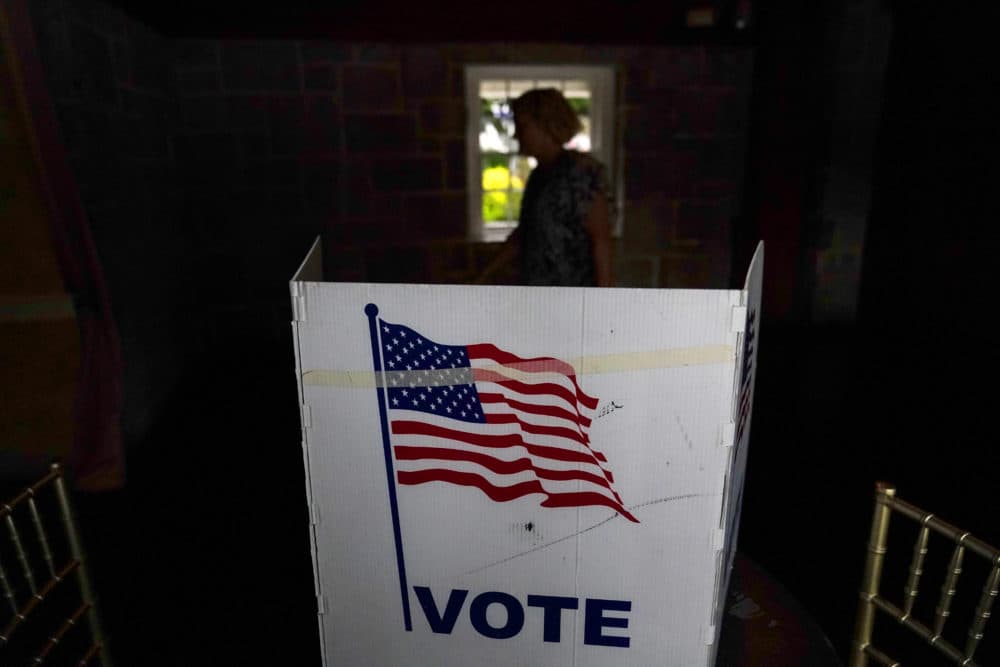Advertisement
How a Supreme Court case on federal elections could imperil democracy
Resume
For two centuries, among the checks and balances protecting American democracy were state courts, governors and state legislatures — all of whom have a role to play in drawing districts and running elections.
But the Supreme Court could soon hand that power to state legislatures alone.
Today, On Point: We hear why some say that would imperil our democracy.
"If we allow for parties who control state legislatures to act in this unchecked manner, I'm not sure we can maintain a democracy anymore," professor Bertrall Ross says.
Guests
Bertrall Ross, professor of law at the University of Virginia Law School. He writes and teaches on constitutional law, constitutional theory, election law, administrative law and statutory interpretation.
Dan Vicuña, national redistricting manager at Common Cause, a nonpartisan group that fights against gerrymandering. (@danvicuna)
Dallas Woodhouse, former executive director of the North Carolina Republican Party. Columnist for the John Locke Foundation, a conservative North Carolina think tank. Executive director of the South Carolina Policy Council. (@DallasWoodhouse)
Interview Highlights
On the background of the ‘independent state legislature doctrine’
Bertrall Ross: “It starts with the provision in the Constitution, Article one, Section four, which says the time, place and manner of holding elections for U.S. senators and representatives shall be prescribed in each state by the legislature thereof. The provision goes on to say that Congress may alter such regulations if it so chooses. Now, how we got there, it started with the case that came out of Arizona about a half decade ago, in which there was a challenge to independent redistricting commissions.
"And the argument that was put forth by Arizona Republicans was that the independent redistricting commissions could not draw district lines. Only the legislature could. Now, the court rejected that theory during the Article one time, place and manner provision finding that the people who ultimately adopted the Independent Redistricting Commission through a referendum did have the power to delegate authority to an independent redistricting commission to draw district lines.
"Now, this theory is returning to the court right now in the context of redistricting challenge. In this case, it was a state court that got involved, as it has gotten involved in many other cases, in invalidating the district lines. And then ultimately adopting a map that was chosen by its special masters.”
The North Carolina Supreme Court rejected the argument that it didn't have the authority to review the actions of the state legislature. It said that would be, quote, ‘repugnant to the sovereignty of states, the authority of state constitutions and the independence of state courts, and would produce absurd and dangerous consequences.’ What were they referring to there by absurd and dangerous consequences?
Bertrall Ross: “Here's the absurd and dangerous consequence that arises. If the court ultimately determines that the state legislature has exclusive authority over state courts with respect to the time, place and manner of holding elections, it would essentially say that the state legislature, in their decisions, trump the state constitution. They would trump provisions in state constitutions that provide for fair and free elections. They would trump, the state legislature would trump provisions of the Constitution that provide for free speech and free assembly insofar as it impacts elections.
They would trump the state legislature in this constitution provision that provides for nondiscrimination in voting, because essentially what the legislature would say, under the state independence legislature doctrine, is that we have all authority over this matter. The court cannot intervene to protect any of these rights contained in the state constitution. That would be pretty absurd and would have far reaching results.”
What do we know about how the Supreme the U.S. Supreme Court justices might rule on this?
Bertrall Ross: “At least four justices have interest in reviewing this case. It doesn't necessarily dictate or indicate how the world of this case, but they think it's enough of an issue or enough of a controversy for the Supreme Court to get involved. What we know in terms of the justices and their views on this matter is pretty little. We have the Arizona case, but that's a different case. In so far as it involves the people of the state, by referendum, adopting an independent redistricting commission. Here we have the question of whether the state courts can be involved in redistricting matters insofar as they review state legislatures practices in this area.
"All we have as indicators, because the court now is very different from the court that decided the Arizona case, is Justice Roberts. Who has suggested that the legislature should have primary authority in this area. He didn't say to the exclusion of state courts, but perhaps that could be an indicator that he would potentially support this theory. But then again ... a couple of years ago ... the Supreme Court said that they would not get involved in partisan gerrymandering, but that state courts, in the end, that Congress can resolve and remedy any extreme forms of partisan gerrymandering.
"So in that case, the court suggests that state courts do have a role to play. All we know in terms of other Supreme Court decisions, such as the decision of Dobbs, is that there are court justices on the court willing to take a very literalist interpretation of the Constitution. So insofar as Article one, Section four doesn't say anything about courts, maybe that would be a reason for those who take on a more literalist interpretation to argue in favor, or define in favor of the independent state legislature doctrine.”
On how the case could impact democracy
Dan Vicuña: “If this case goes the wrong way, it would, of course, be devastating just for redistricting, you know, and which would be certainly bad enough. Calling into question the constitutionality of incredibly important reforms that states have implemented to take the process out of the hands of partisan legislators and give it to independent bodies to try alternative, nonpartisan, open processes for drawing districts.
"Beyond that, you know, you've got certainly a fear of how state courts can provide oversight in other areas, such as you vote by mail restrictions, removal of early voting opportunities, even the secret ballot. And whether that even extends to something as sort of scary as, you know, undermining the popular vote of a state legislature, determining that they'll just appoint whichever electors, determine whichever presidential victor they want to. It's on the table. And it certainly makes me nervous.”
Are there steps that Congress could take to protect the guardrails of democracy to respond to a decision like this?
Bertrall Ross: “Absolutely. I mean, Congress has plenty of authority over this matter. Article one, Section four says that Congress may, at any time by law make or alter regulations that the state legislature adopts. The Democrats in Congress have proposed different forms of regulations of elections that would address unfairness and districting that would potentially police gerrymandering. The problem, however, is that Congress, because of the partisan division and polarization, doesn't have the capacity right now to pass such a law, to pass such a law that would check state legislatures.
" ... I think it's unlikely that those Congress members who stand to benefit from these drawing of district lines would be willing to, in a sense, override state legislatures and necessarily take this power away from state legislatures in ways that might impact their possibilities and probability of being elected in the next election. So there's whole multiple layers of self-interest at issue that makes it hard to imagine that Congress will play a particularly active role in policing this practice of gerrymandering.”
On protecting voting rights and the future of U.S. democracy
Bertrall Ross: "This country is in a position where it needs to be searching for reinforcements of checks and guardrails on our democracy to keep us on a path to maintaining our democracy. And removing the checks works in the opposite direction, removing an important check when the last important checks remains with respect to gerrymandering, and potentially with respect to the counting of electoral votes for the president, would be very threatening to the future of our democracy.
"I don't want to be so pessimistic to say that politicians act completely without virtue. But I will say that virtue has taken a backseat to partisanship. And that partisanship is corrosive to our democracy, at least to manipulation of elections, manipulations of district maps. That is having a tremendous effect on the ability of the people to translate their will into representation. And that is the point of democracy. For the majority of the people to be able to translate its will into elections that are favorable to the majority, and ultimately to results that are favorable to that majority.”
This program aired on July 12, 2022.

